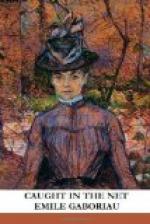“When one has talents like yours,” said he, “success follows as a matter of course.”
He rose to his feet, and affected to examine the sketches on the walls, though his attention was attracted to the covered picture on the easel. He remembered what the garrulous old portress had said about the veiled lady who sometimes visited the painter, and that there had been some delay in admitting him when he first knocked. Then he considered, for whom had the painter dressed himself with such care? and why had he requested him not to smoke? From all these facts Paul came to the conclusion that Andre was expecting the lady’s visit, and that the veiled picture was her portrait. He therefore determined to see it; and with this end in view, he walked round the studio, admiring all the paintings on the walls, maneuvering in such a manner as to imperceptibly draw nearer to the easel.
“And this,” said he, suddenly extending his hand toward the cover, “is, I presume, the gem of your studio?”
But Andre was by no means dull, and had divined Paul’s intention, and grasped the young man’s outstretched hand just as it touched the curtain.
“If I veil this picture,” said he, “it is because I do not wish it to be seen.”
“Excuse me,” answered Paul, trying to pass over the matter as a jest, though in reality he was boiling over with rage at the manner and tone of the painter, and considered his caution utterly ridiculous.
“At any rate,” said he to himself, “I will lengthen out my visit, and have a glimpse of the original instead of her picture;” and, with this amiable resolution, he sat down by the artist’s table, and commenced an apparently interminable story, resolved not to attend to any hints his friend might throw out, who was glancing at the clock with the utmost anxiety, comparing it every now and then with his watch.
As Paul talked on, he saw close to him on the table the photograph of a young lady, and, taking advantage of the artist’s preoccupation, looked at it.
“Pretty, very pretty!” remarked he.
At these words the painter flushed crimson, and snatching away the photograph with some little degree of violence, thrust it between the leaves of a book.
Andre was so evidently in a patina, that Paul rose to his feet, and for a second or two the men looked into each other’s eyes as two adversaries do when about to engage in a mortal duel. They knew but little of each other, and the same chance which had brought them together might separate them again at any moment, but each felt that the other exercised some influence over his life.
Andre was the first to recover himself.
“You must excuse me; but I was wrong to leave so precious an article about.”
Paul bowed with the air of a man who accepts an apology which he considers his due; and Andre went on,—
“I very rarely receive any one except my friends; but to-day I have broken through my rule.”




